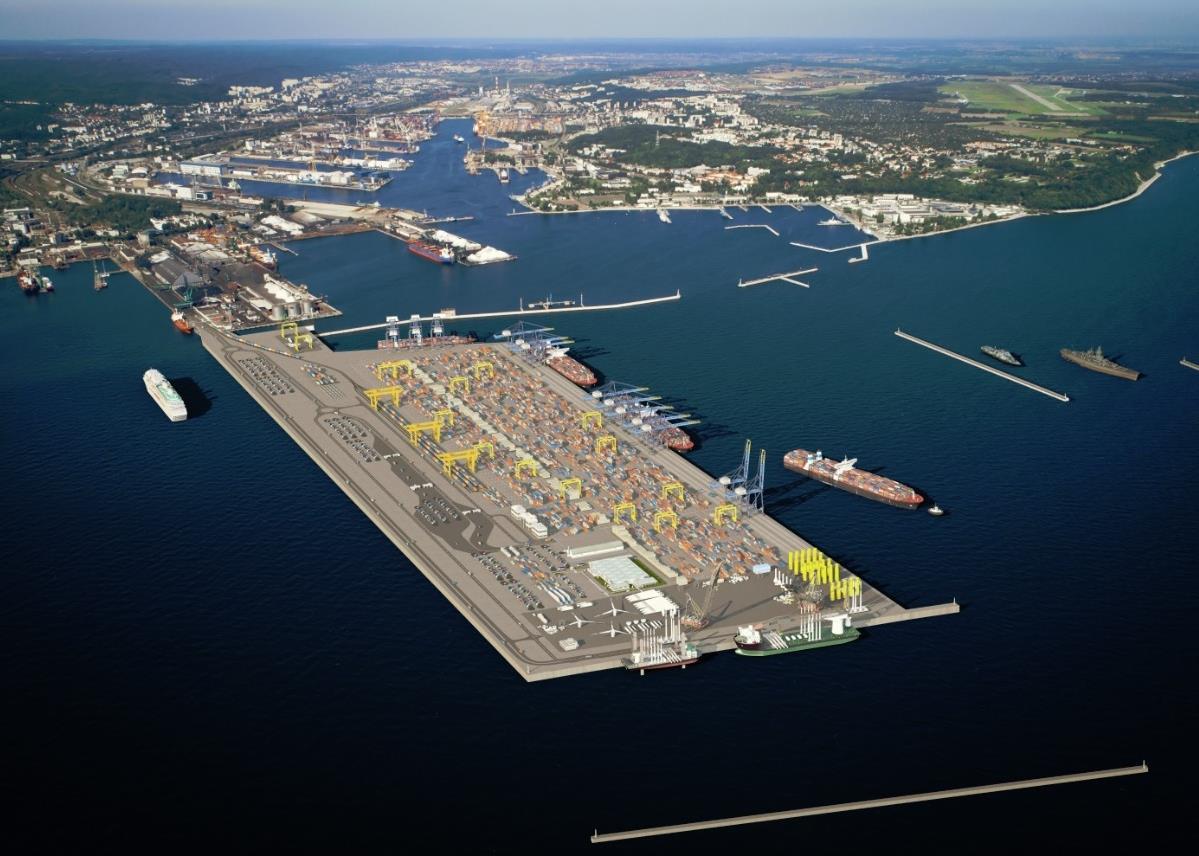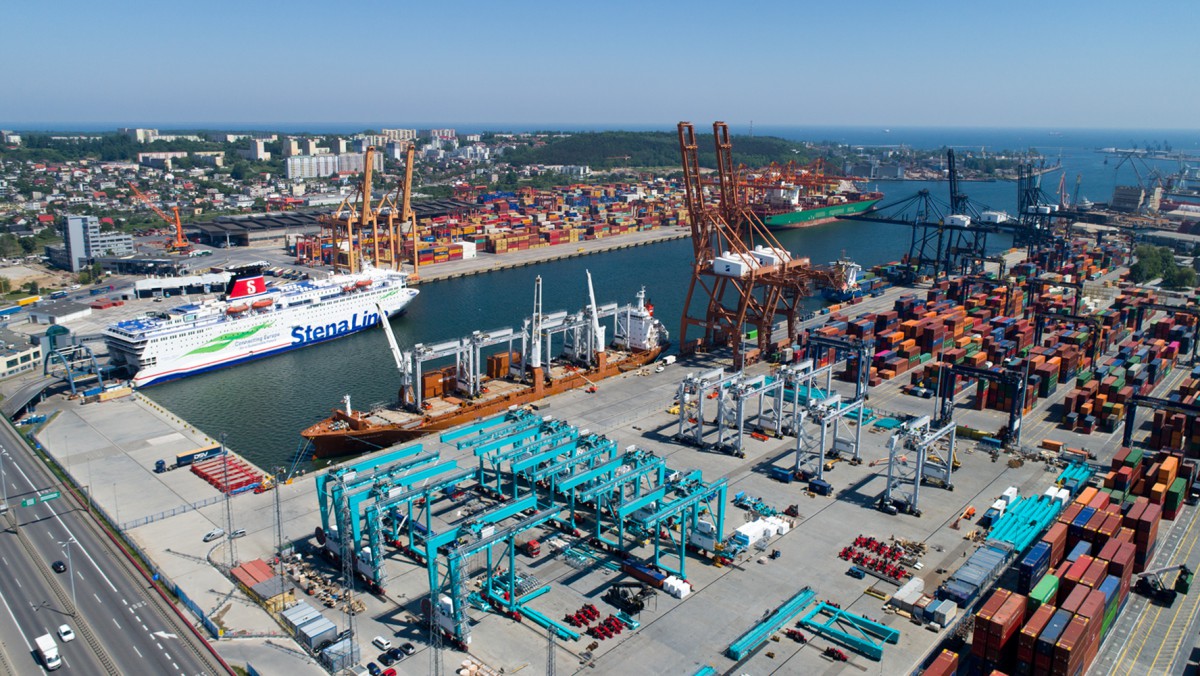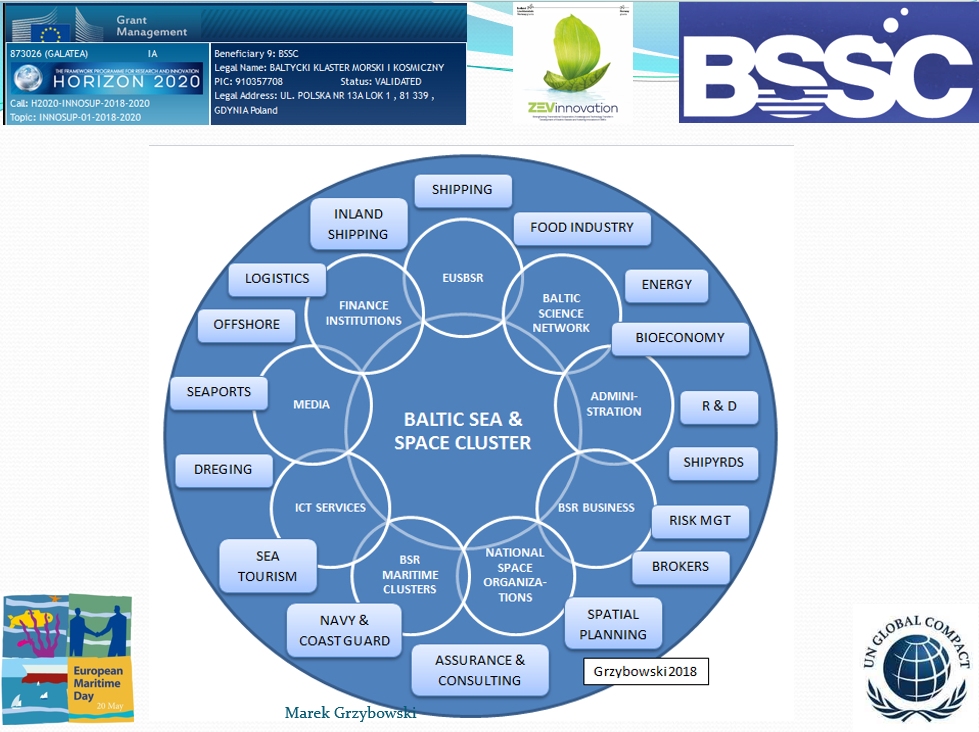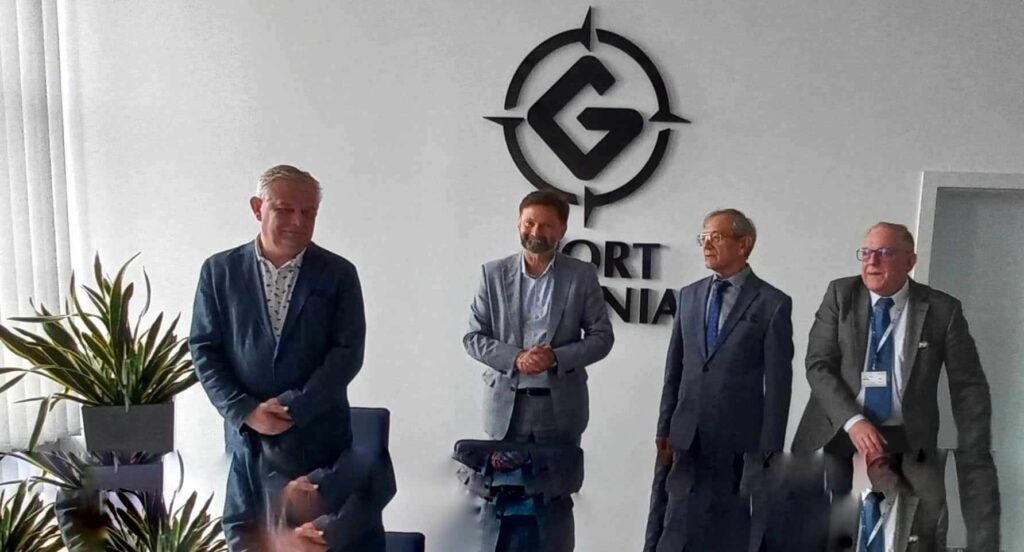
Poland : Marek Grzybowski
The meeting of members of the Baltic Sea and Space Cluster (BSSC) Members with the Port of Gdynia Authority took place on June 28, 2024. The Port of Gdynia Authority (PGA) was represented by Piotr Gorzeński, President of the Management Board of the company Port of Gdynia Authority S.A., Dr. Mirosław Czapiewski, Vice-President of the Management Board for Infrastructure and Asset Management of the company Port of Gdynia Authority S.A. BSSC was represented by Marek Grzybowski, president of BSSC, Krzysztof Anzelewicz, vice-president of BSSC, Krzysztof Ozygała, member of the BSSC Management Board and members of the Baltic Sea and Space Cluster
– Port of Gdynia Authority SA (PGA SA) is a public service company established on 30 November 1999 by the representatives of the Municipality of Gdynia and the State Treasury and has been serving as a managing body of the port since that moment. It directly manages the areas where the operating companies in which a PGA SA holds shares and other independent entities carry out handling and storage operations – informed Piotr Gorzeński, President of the Management Board of the company Port of Gdynia Authority S.A.
Port of Gdynia is a member of the Cluster
The Port of Gdynia is a port established over 100 years ago and has been an important port on the map of the Baltic Sea and European connections for 100 years. Gdynia seaport is a well-identified port on the global logistics map. The port has good historical contacts with ports in Latin America and North America, containers from Asia and European Union ports arrive in Gdynia, and tourists arrive on cruises. The port has strong ferry connections to Poland and Sweden, which is served by a sea highway by Stena Line Polska.

Port of Gdynia – investments for customer convenience
– The port has planned investments that will allow it to accommodate the largest ships entering the Baltic Sea, including mega container ships – informed Dr. Mirosław Czapiewski, Vice-President of the Management Board for Infrastructure and Asset Management of the company Port of Gdynia Authority S.A.
– The Port of Gdynia Authority S.A. successfully finalized as many important investment projects co-funded by the European Union – informs Leszek Jurczyk, Director of Infrastructure at the Port of Gdynia. One of the most important tasks was to deepen the entrance to the port, deepen the water areas of the Gdynia port and strengthen the quays where ships moor – director Leszek Jurczyk shows numerous investments made in the port of Gdynia during the presentation. A very important investment was the construction of a modern ferry terminal with the possibility of powering the ferry with electricity from the quay.
The Port of Gdynia will modernize the Fuel Terminal so that in a few years it will be possible to unload tankers with a deadweight capacity of over 120,000 tonnes. DWT. It will be possible to store and quickly distribute products inland after the expansion of the fuel terminal.

The extension of the port infrastructure for handling ro-ro vessels and the reconstruction a lot of Quays was finished. Located in the eastern part of the port in Basin V, the former investment included, inter alia, reconstruction of the Romanian Quay on a section of about 356 m and reconstruction of a section of the railway line of about 369 m. The investment of total reconstruction of the existing railway terminal was done in the western part of the Port of Gdynia.
The usable length of the loading and subcrane tracks was virtually doubled; now the tracks have a length of almost 700 metres. This allowe handling entire trains and will increase the handling capacity of the terminal up to 24 trains a day. The infrastructure modernization projects get to develop transport in the Baltic – Adriatic Transport Corridor of the TEN-T network by increasing the share of sea and railway transport
The Outer Port – a prospect for a global logistics operator
The Gdynia Seaport will soon start building new breakwaters. They will cover the planned external port. The external port will be built in the form of a public-private partnership. The planned Outer Port will be located in the waters of the Bay of Gdansk and in the area of the Main Access Fairway leading to the inner part of the Port of Gdynia. The size of the container terminal will depend on the results of economic analyses. Ultimately, target capacity is 2.5 million TEUs per year, equivalent to approximately 25 million tonnes.
– The Outer Port will be able to effectively handle ocean-going container ships with Baltimax parameters, i.e. with a length of up to 430 metres (in the longer term 490 metres), a width of up to 60 metres (in the longer term up to about 70 metres) and a draught of up to 16 metres – informed Director Jurczyk and added: „Reconstruction of the Helskie Quay in the Baltic Container Terminal is inthe finala stage over a length of 800 meters. A new turntable is build inside the port. The turntable will be used by ships 400 meters long”.
In the terminals of the Port of Gdynia, reloading reached 29.4 million tons. This is an increase of 5.25%. y/y. The Port of Gdynia Authority’s profit exceeded PLN 100 million. This represents an increase of 24 percent compared to 2022.
The Port of Gdynia has the technology and provides LNG ship bunkering using the tanker-ship method. Transhipment terminals are switching to the introduction of zero-emission ship handling equipment.

BSSC – the key maritime cluster in the Baltic Sea region
The Baltic Sea and Space Cluster is a key maritime cluster in the Baltic Sea region, an active member of the European Network of Maritime Clusters, the United Nation Global Compact and the Cluster Collaboration Platform. In 2023, the cluster took an active part in international projects GALATEA, ZEVInnovation, INTERMARE, and is a business partner of the International University of the European Union SEA EU. Cluster members took active part in BALTEXPO 2023, Nor Shipping and Posidonia 2024 and the Polish Ports Congress 2023 and 2024. BSSC is a key maritime cluster in the Baltic Sea region.
– The BSS Cluster is working as the Pentagon Helix HUB organization. It integrates the transfer of knowledge between science and business, supports social initiatives, local governments and administration, develops investor relations in the maritime and space industry. The cluster acts as a smart organization. We view maritime and space business in a holistic manner. BSSC integrates technological, legal and economic solutions at the scientific, business and social level – informed prof. Marek Grzybowski, President of the BSSC.
The Baltic Sea & Space Cluster is strongly based in seaports, shipyards, the Pomeranian Special Economic Zone and innovative companies involved in the production and services of maritime industries. Research and education are an important part of the cluster’s activity.
– In Gdynia, in the area of the former Gdynia Shipyard, the production profile was changed – informed Anna Różycka, Deputy Director, Pomeranian Special Economic Zone, Baltic Port of New Technologies.
Instead of simple vessels for container and ro-ro ships and bulk carriers, specialist vessels worth EUR 200 million are being built by CRIST in Gdynia for the offshore industry, as well as research and special vessels. Innovative projects are also carried out in the form of digital twins (Cador Consulting) and ship repairs and industrial works (NAUTA Shipyard). HYDROMEGA produces innovative hydraulic devices in this zone, which is located within the Port of Gdynia.
We are also developing production activities in Szczecin, in the West Pomeranian Voivodeship – says Krzysztof Ozygała, owner of a production company and member of the Cluster’s management board.
Strong activity in the field of maritime education and science
Cluster members develop strong activity in the field of maritime education. The Maritime School in Gdynia educates sailors, officers and mechanics for all types of ships and for the offshore industry. – We also train fitters for the construction and servicing of wind farms – says Katarzyna Ozdowska from the Maritime School in Gdynia.
– Flint Systems produces modern simulators supporting the training of specialists in the maritime business – says Marek Grzybowski. – Flint Systems simulators use the latest IT programs and VR devices and are used in the training of specialists in port terminals and on offshore wind energy service ships – explains Grzegorz Szatkowski, Vice President & Co-owner, Flint Systems.
The Maritime University of Gdynia together with the Maritime Institute and the Offshore Research Center are strong members of the BSSC Cluster. Gdynia Maritime University is currently one of the most highly ranked maritime universities in the world. Rector prof. Adam Weintrit is the chairman of the International Association of Maritime Universities (IAMU) Academic Affairs Committee.
– The University offers undergraduate engineering and master’s degrees for prospective merchant marine officers, as well as engineering and managerial personnel for the maritime industry – informed prof. Tomasz Tarasiuk, vice-rector of Gdynia Maritime University.
– A very important activity of the Cluster is scientific activity and knowledge transfer – said prof. Edmund Wittbrodt, former rector of the Gdańsk University of Technology and former Minister of Education in the Polish government.
– Every year, the Baltic Sea and Space Cluster, universities and research institutes and the Space Sciences Committee of the Polish Academy of Sciences in Gdańsk organize 4 international conferences and seminars on space technologies, maritime and space law, business and scientific aspects of the use of sea and space – informed prof. Edmund Wittbrodt, Space Sciences Committee of the Polish Academy of Sciences in Gdańsk. The cluster promotes the achievements of young scientists and students. During the conference, knowledge is transferred between business representatives and scientists.
The BSSC Think Tank has a strong position in the Baltic Sea market. The main objective is to identify trends in the global maritime economy and space technologies and their environment, as well as to create strategies and set directions for development in the maritime economy and space technologies in the Baltic Sea Region.

BSSC – the Pentagon Helix HUB organization
Baltic Sea and Space Cluster specialized research teams operate within six Hubs, which brings together 60 Polish innovative companies – informed Krzysztof Anzelewicz, Vice-President of the BSSC.
There are currently six Hubs: ICT & AI, construction of zero-emission ships – ZEVInnovation, design and construction of installations producing green energy – GreenTech, scientific-research, legal-financial and educational. All hubs bring together around 60 companies, research centers and R&D units. They cooperate with a group of approximately 2,300 cooperators, companies specializing in the design and implementation of innovative marine and space technologies, research and development, education and professional training for maritime industries.
The Baltic Center for Economic Mediation plays an important role in supporting companies and maritime administration. Its activities are coordinated by Barabra Matysiak. This activity is supported by Dr. Magda Konopacka, a researcher at the Business and Administration University. Polish companies operating in the maritime economy can also receive legal and financial support from the legal-financial hub, headed by attorney Mateusz Romowicz.
Thanks to the active cooperation, the best Polish initiatives have a chance to be commercialized in the maritime sector. Among others, there is already an emission-free ship HUB, ICT & AI HUB as well as an idea for a hybrid system of renewable energy production.
For over a dozen years the Baltic Sea and Space Cluster (BSSC) has been supporting innovations and development in the field of research, entrepreneurship, administration and local government, which are related to the Baltic Sea Region and the world ocean.
The Baltic Sea and Space Cluster is a continuation of activities undertaken by its members, who over 25 years ago took the initiative to establish a maritime cluster in Poland. During the period of economic transformation, it integrated the activities of leading maritime enterprises on innovative undertakings and new markets.
– Today the cluster develops in the Pentagon Helix formula, integrating the transfer of knowledge between science and business, supporting social initiatives, local government and administration, developing investor relations, says President Marek Grzybowski and explains that today the cluster’s activity is characterized by a holistic, integrative and global approach, making the activity of Maritime 4.0 industries part of Economy 4.0.
BSSC is also a strong cluster of international projects. The cluster continued the projects it started in 2021 and 2022 in 2023. The cluster was invited by Aerospace Valley and Le Pôle Mer Méditerranée to participate in the Horizon 2020 project. By Center for Technology Transfer LLC from Croatia and ÅKP from Norway to the project financed by Norway Grants.
BSSC – HUB of international projects
The ZEVinnovation project established a sustainable and efficient network for the development of innovative technologies that bring together active stakeholders. The ZEVinnovation network contributes to the strengthening of the transnational eco-system through the implementation of pilot programs focusing on the collaborative development and market uptake of zero-emission vessels. ZEV HUB is connecting the capacities of the EEA countries that have a strong maritime tradition and potential of the ZEV design and production.
The GALATEA project was supported the development of technological and process innovations in the following areas: seaports (Smart & Green Ports), ships (Smart & Green Ships), shipbuilding and ship repairing business (Smart & Green Shipyard) and control and monitoring of sea areas (maritime surveillance). All initiatives aimed at progress in ports, shipyards and seas was financed. In this area, the Baltic Sea and Space Cluster has undoubted achievements.
SpaceUp Project is a project financed by the EU Framework programme for Research and Innovation (Horizon 2020). Throughout the project lifetime six Space Academies was take place in various locations in Europe, networking new space tech entrepreneurs with potential partners. Throughout the project lifetime 6 Space Academies was take place in various locations in Europe, networking new space tech entrepreneurs with potential partners in Finance, Business, Space Clusters and Science Parks, plunging Start-ups into a genuinely European Space ecosystem.
ECOPRODIGI is another important project in which the cluster participated, as suport partner. The Ecoprodigi project increased eco-efficiency in the Baltic Sea region’s maritime sector by creating and piloting digital solutions in close collaboration between industry end-users and research organizations. ECOPRODIGI supported the Baltic Sea region in becoming a leader in the digitalization of the maritime industry and clean shipping. The ECOPRODIGI project not only provided much-needed information on the industry’s key eco-inefficiencies, but also developed digital solutions to better measure, visualize and optimize processes in the maritime industry.
The ELMAR project aimed to support SMEs at emerging the international supply chains as well as accessing foreign sales markets for boats & ships with electric propulsions. Project consortium worked like a HUB. It connected the markets from the supply and demand sides. The consortium consisted of the partners from Germany, Poland and Lithuania, representing regional development agencies, scientific institutions, branch associations of the yacht technology suppliers, as well as electric boat producers.
The cluster started cooperation under the I3-4-BLUE-GROWTH project in 2023. I3-4-BLUE-GROWTH is a capacity building and investment project preparatory action aimed at promoting interregional cooperation for innovation and investment projects in high-priority and value-added markets of the blue economy sector. By bringing together European leading actors of Q-helix (2 national public authorities and one regional government), technology centres and industry clusters with track-record in blue economy sector, we aim at responding to the needs of 6 less developed regions from 4 countries (PT, ES, HR and PL) in key areas for smart specialization of these regions.
Project partners will build on experience of 2 more developed regions (NL and IT) and 2 transition regions (FI and FR), which are leading European regional ecosystems in their respective fields. The primary objective of the project is to enhance capacities of less-developed coastal & insular European regions to build and reinforce innovative ecosystems for the development of a sustainable and smart blue economy.
The project will focus on two specific value chains (sustainable fisheries, aquaculture and valorization of blue resources; Renewable Marine Energy and maritime decarbonization) aiming to deepen understanding of the related interregional value chains, transferring knowledge and good practices, and identifying a pipeline of innovative investments to promote sustainable growth of blue economy value chains.
The project will equip regional stakeholders and SMEs with technical, business and investment readiness expertise, networking, business matchmaking and brokerage opportunities towards joint interregional innovation investment projects. Based on peer-to-peer knowledge exchange and regional field trips, it will provide them with exemplary best practices and advances in the sector, from both interregional policy, financing and industry perspective.
The cluster will start cooperation under the BLUEDOTS project in 2024. BLUEDOTS Project aims to build the capacities of Social Economy SMEs acting in the Blue Economy to apply digital-social innovation and principles, fostering a smoother and faster transition of the blue economy toward smart, sustainable, and inclusive models. The project acknowledges the vital role of the Blue Economy in achieving the objectives of the EU Green Deal and recognizes its potential to enhance the competitiveness of social economy SMEs and vice-versa. The primary goal is to help social economy SMEs to strengthen their digital capabilities and digital transition. The secondary objective is to drive digital social innovation among “enabling organisations”.
BSS Cluster Members at the most important international events
BSSC members participated in Nor Shipping 2023. Taking place on June 3-6, Nor-Shipping 2023 is the most important event of the year in the maritime business. The event was attended by approximately 1,000 exhibitors and approximately 50,000. participants – representatives of business and politics, science and maritime clusters, leading research and expert companies from around the world. BSSC participated in a hydrogen seminar organized at Nor Shipping by the Polish Investment and Trade Agency and the Polish Embassy in Oslo.
BSSC Members participated in the Posidonia 2024. Poland have had its national stand, the Embassy of the Republic of Poland in Athens is organized seminar entitled “Poland – Thinking out of the box about maritime industry.” Representatives of European maritime clusters, members of the European Network of Maritime Clusters, also took part in the seminar. Representatives of European maritime clusters, members of the European Network of Maritime Clusters also met with Mr. Arkadiusz Marchwka, Secretary of State for Maritime Economy, Water Management and Inland Navigation at the Ministry of Infrastructure of the Polish government.
Posidonia 2024 has already gone down in history as the best-attended in the biennial event’s 55 years of existence. A total of 32,527 visitors from 130 countries and territories attended the event, an increase of 12% compared to Posidonia 2022. A total of 81 countries and territories from around the world exhibited with the majority coming from Europe and Asia.
BSSC participated in the ENMC 𝟮𝟬𝟮𝟰 𝗔𝗻𝗻𝘂𝗮𝗹 𝗚𝗲𝗻𝗲𝗿𝗮𝗹 Assembly in Athens. Strategis – Maritime ICT Cluster welcomed the ENMC in the historic city of Athens for three days of an intense program. The General Assembly addressed essential topics such as the ENMC roadmap for the year ahead. It reviewed past activities and upcoming ones. Members shared news from the BlueEconomy of their countries and expressed their expectations.
The Scottish Maritime Cluster participated in the event. Duncan Cunningham and Brian Fulton, as special guest, which presented its activities and discussed the current state of the maritime industry in the UK. For the attendees on-site, the assembly was followed by several activities such as a tour of the Port of Piraeus and Marina Zea, networking dinners, and an accompanied visit to the maritime fair Posidonia. The ENMC attended the “𝘗𝘖𝘓𝘈𝘕𝘋 – 𝘛𝘩𝘪𝘯𝘬𝘪𝘯𝘨 𝘰𝘶𝘵 𝘰𝘧 𝘵𝘩𝘦 𝘣𝘰𝘹 𝘢𝘣𝘰𝘶𝘵 𝘮𝘢𝘳𝘪𝘵𝘪𝘮𝘦 𝘪𝘯𝘥𝘶𝘴𝘵𝘳𝘺” conference.
Study visit in Norway – meetings with the Norway Clusters
BSSC took part in a study visit of PARP and Innovation Norway, during which it established contacts with maritime clusters in Norway in May 2023. In Trondheim, there was a presentation of the Norwegian cluster policy and meetings with representatives of the clusters: MARITIMT-FORUM, RENERGY CLUSTER, OCEAN AUTONOMY CLUSTER.
The meeting with representatives of NCE MARITIME CLEANTECH CLUSTER, NOSCA CLEAN OCEANS CLUSTER, PROPTECH INNOVATION CLUSTER took place in Bergen. Marek Grzybowski, president of BSSC, took part in the FLOATING WIND DAYS 2023 conference and fair in Haugesund. The meeting with representatives of ENERGY TRANSITION NORWAY, NORDIC EDGE CLUSTER took place in Stavanger.
The Polish Agency for Enterprise Development and Innovation Norway, together with the BSSC Cluster, organized a communication event “Zero-emission technologies in maritime economy” with Norwegian companies during the largest maritime fair in Central and Eastern Europe: Baltexpo 2023 in Gdańsk. The event was attended by over 50 representatives of 40 companies and organizations operating in the maritime industry from Poland and Norway.
The launch of the projects gives members of the Baltic Maritime Cluster and Polish maritime companies the opportunity to participate in the transfer of knowledge, internationalization and commercialization of products and services. It also puts the cluster among many of the most active faculties and scientific institutes, considering that the cluster is currently active in four international scientific research and application projects.
The cluster is developing in the Pentagon Helix formula, integrating knowledge transfer between science and business, supporting social initiatives, local governments and administration, and developing investor relations. The cluster’s activities are characterized by a holistic, integrative and global approach, integrating the activity of maritime industries into the 4.0 economy with a large load of ICT systems and tools as well as space technologies.




